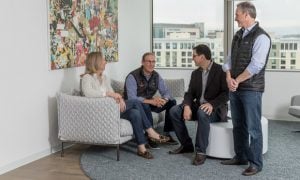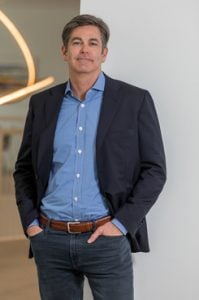 A group of partners and office leaders from Goodwin's California offices. Back row: An-Yen Hu, Lynda Galligan, Brett Schuman, Caine Moss, Scott Joachim, Heidi Mayon and Neel Chatterjee. Front row: Dean Pappas and A.J. Weidhaas.
A group of partners and office leaders from Goodwin's California offices. Back row: An-Yen Hu, Lynda Galligan, Brett Schuman, Caine Moss, Scott Joachim, Heidi Mayon and Neel Chatterjee. Front row: Dean Pappas and A.J. Weidhaas.
In less than 15 years, Boston-born Goodwin Procter has become a known entity, and frequent adviser, to Silicon Valley's entrepreneurs.
Competing head-to-head with its Big Law rivals in the valley, Goodwin represented about 11 percent of startup clients last year, according to a survey by Kruze Consulting; it was the only East-Coast-born firm to land in the top five for startup client market share.
The firm recently made headlines for representing online workplace communication company Slack in its initial public offering. And it represented the underwriters in Lyft's highly anticipated IPO, sharing a $1.4 million legal fee with Palo Alto-based Wilson Sonsini Goodrich & Rosati.
Goodwin's growing role in the emerging growth space hasn't been by accident.
Chairman David Hashmall, who has led the Am Law 100 firm since 2014, said Goodwin's strategy is centered on becoming a top player in tech, life sciences, private equity, real estate and complex IP litigation.
“What we have been trying to do, and I think we have done, is to develop a dominant market presence across those areas,” Hashmall said. “We really see ourselves having particular expertise in advising high-growth, innovative and really often disruptive businesses on the challenges and opportunities they face.”
Goodwin has been aggressively expanding on the West Coast since it planted a flag in California in 2006.
The firm now has 215 lawyers across its San Francisco, Palo Alto and Los Angeles offices, after announcing the addition of two more partners Monday. And a new Santa Monica office is set to officially open this summer with about 15 technology and private equity lawyers expected to join on day one.
[falcon-embed src="embed_1"]
“We are looking to grow our footprint at this point,” said partner Lynda Galligan, who has led the firm's California growth. “We have everything covered, it's just a matter of growth.”
Bold Beginnings
Goodwin made its California debut 13 years ago with a handful of San Francisco and Los Angeles partners plucked from Cooley and Pillsbury Winthrop Shaw Pittman.
Regina Pisa, the first woman to lead an Am Law 100 firm, was Goodwin's chairwoman and managing partner at the time.
“There was no clear future for a firm dominant in one market only,” Pisa told The American Lawyer in 2008 interview. Becoming a national player, and therefore creating a West Coast stronghold, was an imperative.
 Lynda Galligan, chairwoman of the Silicon Valley office; A.J. Weidhaas, chairman of the Santa Monica office; Dean Pappas, chairman of the Los Angeles office; and Brett Schuman, chairman of the San Francisco office. (Photo: Jason Doiy/ALM)
Lynda Galligan, chairwoman of the Silicon Valley office; A.J. Weidhaas, chairman of the Santa Monica office; Dean Pappas, chairman of the Los Angeles office; and Brett Schuman, chairman of the San Francisco office. (Photo: Jason Doiy/ALM)The California expansion was fast, but not without adjustments.
Just a year after launching in San Francisco and Century City, Goodwin added three more California locations—Downtown Los Angeles, San Diego and Palo Alto.
But it backtracked a few years later, closing the Century City office in 2011 and the San Diego office in 2012. The firm laid off 10 attorneys, including four partners, in the process, The Recorder reported at the time.
“San Diego, from a geographic perspective, is no longer a strategic location for building the future of the firm,” firm leadership said at the time, promising to “reallocate our investments to those markets in California that hold greater promise for us.”
But the Silicon Valley office, which relocated to downtown Redwood City last year, has grown sevenfold since it opened and now numbers more than 75 lawyers.
Former Goodwin partner Kathy Fields moved out to California in 2007 to help build out the firm's Bay Area presence. She is now general counsel at Goodwin client JMI Equity.
In the years she was with the firm in California, she says she spent all her spare time recruiting and promoting the firm. “All I did was have coffee, lunch and dinner” with other lawyers in the market, Fields said.
The challenge for Goodwin, or any firm moving into the Bay Area, is that there is already a wealth of legal talent and activity there, Fields said. “I think the challenge is distinguishing why your platform is different.”
A central selling point for Goodwin was its massive acquisition of a group from now-defunct Testa, Hurwitz & Thibeault, Goodwin's Boston-based rival that focused on high-tech clients. When Testa began to unravel in late 2004, Goodwin's Pisa moved quickly and convinced 25 Testa partners and more than 60 associates to join Goodwin. Fields was one of the Testa lawyers.
It impressed potential California laterals that “Goodwin had digested the tech practice from Testa,” Fields said. “People were as interested in hearing about the Testa story as the Goodwin story.”
In the process, Goodwin picked up work for clients, including Alkermes, Athenahealth, Phase Forward, iRobot Corp., and venture capital firm General Catalyst Partners. The Testa group instantly bolstered Goodwin's tech market share along the Route 128 corridor—Boston's version of Silicon Valley—thus paving the way to California.
“We were able to demonstrate that Goodwin actually understood that venture capital is different than private equity, technology startups are different than real estate companies,” Fields said.
And that helped the firm woo “homegrown” Silicon Valley talent, in particular, Fields said, Anthony McCusker and Craig Schmitz.
Selling Goodwin to Locals
 Anthony McCusker. (Photo: Jason Doiy/ALM)
Anthony McCusker. (Photo: Jason Doiy/ALM)Those who know Goodwin in Silicon Valley probably know Anthony McCusker as well.
McCusker joined Goodwin in 2010, coming from local firm Gunderson Dettmer. It took over a year for Kevin Dennis, then the managing partner of Goodwin's Silicon Valley office, to lure McCusker, along with partners Schmitz and James Riley Jr.
When they joined Goodwin, the firm's Silicon Valley office was only 3 years old, while Gunderson—itself a relatively young firm, having launched in 1995—was entrenched in Silicon Valley's tight-knit startup scene.
But McCusker saw strength in joining a platform with its foundation in another emerging tech city.
“Technology and innovation are not limited [to] just Silicon Valley,” McCusker said.
Two months after hiring McCusker's group, Dennis brought on Wilson Sonsini partner Caine Moss, in Silicon Valley, who became part of the technology companies practice with McCusker and Schmitz.
From 2014 to 2018, Goodwin recruited more than 200 lawyers to its California offices, including 25 partners.
Most of these laterals came from competitors with roots in Silicon Valley, including Gunderson, Fenwick and Wilson Sonsini. Losing partners to non-California-based competitors was rare for these firms—until recently.
“For a nonindigenous firm, [Goodwin] seems to have done a better job than any other firm that has come from outside,” said California-based legal recruiter Avery Ellis. “And, it seems like it is getting stronger and attracting more talent.”
Just this February Goodwin nabbed two pairs of life sciences partners from Fenwick and Sidley Austin, in San Francisco and Silicon Valley, respectively.
And McCusker, initially a hard sell, became an evangelist for Goodwin in California. In 2012, he replaced Dennis as Silicon Valley chairman, a role he passed to Galligan in 2014.
“I spend a ton of time recruiting,” McCusker said.
His recruits included corporate partners Lawrence “Larry” Chu and Michael Russell from Wilson Sonsini, former Morgan, Lewis & Bockius IP litigator Brett Schuman, and longtime Orrick partner Neel Chatterjee, also in IP and litigation.
“Goodwin was becoming a dominant force in the market, in the entrepreneurial community,” Chatterjee said in a recent interview. The firm's Bay Area litigation team, while small, has been “aggressively making ourselves known in the market.”
Still, Chatterjee noted, fighting for a place in the market, against firms with a longer history there, is an ongoing battle.
“The challenge for us is the challenge of incumbency,” he said. “There are a lot of people in the Bay Area that have entrenched relationships with people that clients are often comfortable with, who they know.”
Building on the Momentum
Galligan, who has spent her entire 18-year career at Goodwin, has led the firm's West Coast expansion efforts since her 2011 move from Goodwin's Boston office to its Silicon Valley location.
 Silicon Valley office chairwoman Lynda Galligan toasts Goodwin's official new office opening in Redwood City. (Photo: Jason Dooy/ALM)
Silicon Valley office chairwoman Lynda Galligan toasts Goodwin's official new office opening in Redwood City. (Photo: Jason Dooy/ALM)She said “recruiting is much easier” in recent years. So much so that the Silicon Valley group ran out of room at its Menlo Park office, and moved to a new location in downtown Redwood City last year.
“People approach us because they see what we are doing, they know us, they see us on the market and they want to be part of it,” Galligan said.
California legal recruiter Larry Watanabe said recruiting for Goodwin has become “a lot easier” because of the firm's rising profile in the tech market. He attributed that largely to McCusker.
Watanabe added that Goodwin has been “extremely competitive” with compensation for the right candidates.
Asked about that, Galligan said the firm's profitability certainly gives it an edge over some firms in the recruiting race, but she said Goodwin doesn't attract laterals with big paychecks alone.
“I don't feel like we have to do that. … I haven't seen us contort to overpaying people simply to get them to join us,” she said.
Partner Scott Joachim, the former Fenwick private equity chairman who joined Goodwin last spring, said Goodwin's compensation structure was a draw for him. But it wasn't about the concrete dollars as much as how the policy meshes with the firm's long-term strategy.
“There is much less emphasis on chasing year-end bonuses,” Joachim said. “I don't even want a bonus—I don't expect it unless something extraordinary happens.”
Diving Deeper in Tech
As private equity investors increasingly inject themselves in technology deals, the foundation that Goodwin has built in California has created opportunities for the firm in the era of technology convergence.
Greg Williams, managing director at technology-focused private equity firm Accel-KKR, is a client of Joachim, and followed him to Goodwin. While Accel-KKR is based in Menlo Park, California, Williams said they have portfolio companies spread across the country, Europe, Australia and South America, making Goodwin ideal counsel for the firm.
“Many of us have years of experience in other markets like Boston or New York, or other places Goodwin has been for a long time,” Williams said. “We have seen them across the table, we know their names generally from the market.”
Goodwin had 955 lawyers across its 10 offices worldwide last year. The firm said it has about 175 partners involved in its technology, life sciences and private equity practices.
“If you want to be a modern law firm that represents the most interesting businesses, you better understand innovation and technology, not just cursory level, you need to be dedicated to it, build the team,” McCusker said.
In addition to asserting its dominance in the Bay Area startup community, McCusker added, Goodwin has been courting the entrepreneurial communities in Los Angeles, New York and Boston, and adding to its tech capabilities in Europe and Hong Kong.
“We want to continue to do the work we are doing here. We want to continue to build,” McCusker said.
[falcon-embed src="embed_2"]
Read More
Goodwin Names New Chair, Managing Partner
Goodwin Procter Sees Revenues Soar on Tech, Life Sciences Deals
© Touchpoint Markets, All Rights Reserved. Request academic re-use from www.copyright.com. All other uses, submit a request to [email protected]. For more inforrmation visit Asset & Logo Licensing.







